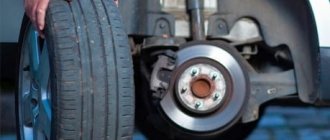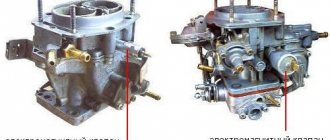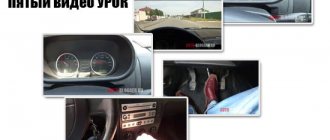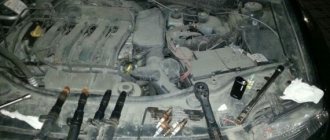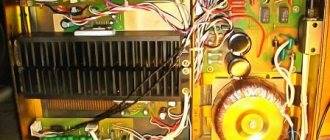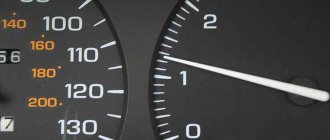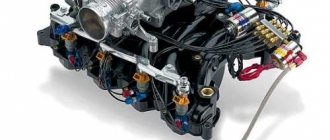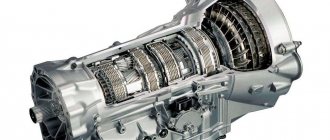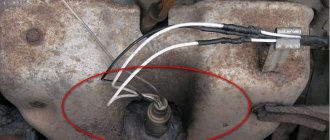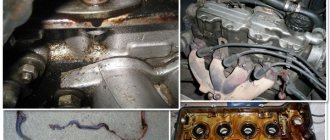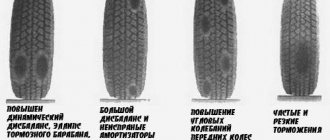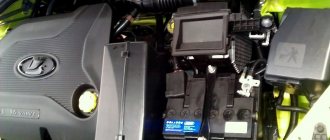Causes of vibrations in the brake pedal
This unpleasant phenomenon can occur for several reasons. In most cases, professionals note brake discs and brake drums. Less often (but also should not be excluded) air is found in the brake system lines. Sometimes the reason is badly worn tires or wheels with imbalance. Crooked wheels also mean steering wheel vibration when braking. Problems with the operation of the anti-lock braking system rarely occur, but this malfunction is easily diagnosed by the car's ECU. Worn components will not be considered among the reasons.
How to eliminate runout?
When your car's steering wheel vibrates slightly during heavy braking, you can simply do nothing and drive on, taking appropriate safety measures. The trick is to avoid decelerating too quickly, otherwise the problem will get worse and you risk losing your vigilance and running off the road.
Recommendation. Before further operation of the car, make sure that the culprit of the steering wheel runout is a defect in the brake disc, and not other reasons.
If the beating is quite noticeable and really threatens the safety of people (vehicle passengers and pedestrians), the deformed disk should be replaced or restored. The first way is associated with significant financial costs - spare parts for some brands of cars are quite expensive. In addition, the brake discs must be replaced in pairs, otherwise during moments of sharp deceleration the front part of the car will begin to pull to the side.
Disc restoration involves turning on a specialized machine . The equipment of advanced service stations makes it possible to process metal without removing the defective part from the machine. The procedure will be cheaper than purchasing and installing new spare parts.
When the car shakes when braking, regardless of speed, you need to look for and fix the problem elsewhere:
- Make sure that the linings of the rear and front wheels are not flooded with brake fluid. A secondary symptom is a decrease in its level in the expansion tank.
- Check the functionality of the brake calipers and wheel cylinders. The cause of vibration is often a jammed piston, and fluid leaks are often caused by a leaky cuff.
- Sometimes the steering wheel starts to vibrate after replacing the pads. This symptom indicates low quality of installed spare parts.
In some cases, vibration appears due to broken brake pads. The malfunction is accompanied by an extraneous sound of grinding or rubbing against metal.
Steering wheel wobble when braking can occur for several reasons. The fact of vibration of the steering unit is not only unpleasant for the driver, but in some cases also leads to accidents and departures from the road. A car is a high-risk vehicle, so even the most minor problems must be treated with the utmost care and problems must be corrected at an early stage.
Changing the brake disc geometry
This is another reason that leads to vibrations in the brake pedal and steering wheel. It involves rapid cooling of the disk. When the driver has an aggressive driving style and moves dynamically from one traffic light to another, the discs simply do not have time to cool down. But overheating can also occur during quiet driving due to the caliper, which cannot provide enough clearance between the pads and the disc.
Why does the steering wheel shake when braking?
Here are some of the suspected reasons:
- Crooked unbalanced wheels
- The bearing broke
- Worn worn brake discs
The reasons for the steering wheel beating when braking are the same as when driving; it is improper wheel balancing. Plus, the brake discs are added to this; when they are curved, the pad runs along their entire curvature, thus causing the wheel to wobble in different directions, this is due to the fact that the wheel has great inertia, and if you start to swing it, it will resist, and the vibrations may die out, but this may not happen; the steering wheel hits very hard when braking at high speed, since the wheel has great inertia and, when braking, enters into resonance, increasing the vibrations. Therefore, when braking, the steering wheel and brake pedal hit; the pad cannot press tightly against the disc, and it bounces back, thereby putting pressure on the pedal.
This all happens due to crooked brake discs, which began to wobble during heavy braking and now have runout. But the same can be caused by a broken bearing that does not hold the wheel straight, especially during intense braking at high speed. That's why there is vibration when braking.
Vibration is especially noticeable when braking on the VAZ-2110, VAZ-2114 and other products of the Russian automobile industry, for which the Chinese brothers rivet spare parts of special quality.
It is worth remembering that a car is a single mechanism in which one breakdown can easily provoke a number of others. If the steering wheel shakes, no matter what speed, it is a problem in the wheels. Either the integrity of the tire or the balancing is compromised. In both cases, it is necessary to contact a service station, since an ordinary motorist cannot cope on his own.
Deformations in drum brakes
Drum brakes are practically not subject to deformation, but sometimes troubles can happen to them. They, like disk ones, can overheat (but to a much lesser extent). Overheating occurs if, in a hurry, the driver forgets to release the handbrake and at the same time drives a fairly long distance. The driver may not notice that the car is practically not moving. When stopping, the handbrake remains raised, or the handbrake is pulled again.
conclusions
Knowing these points, the owner can independently identify the reasons why the steering wheel of his VAZ-2112 car occurs when braking or at speed. If you cannot identify the reasons yourself, you should contact a service station. Operating a car with such a malfunction is dangerous!
Again, as in the case of the brake pedal beating, service technicians recommend changing the front brake discs. But in this case the problem will not go away, because... The reason most likely was not hidden in the brake system.
Reasons for the steering wheel beating when braking:
- Supports, engine mounts - check tightness, condition of rubber bands, replace if worn.
- Worn steering rack. In this case, the rack should knock when turning the steering wheel and while driving. It is recommended to replace the steering rack, but there are also repair kits for it, and you can also try tightening it. Repair and tightening will give a temporary effect; in any case, it will have to be replaced.
- Worn balls, balls and steering ends - it is better to replace everything as a set rather than replacing them individually.
- Suspension elements are not fully secured: struts, ball joints, etc.
Also pay attention to the possible causes of the brake pedal beating, because... It is often found that these problems intersect and the cause of steering wheel beating is the brake elements, wheels: balancing, wheel alignment, etc.
The hub as the cause of vibrations during braking
This is a very rare reason, but it should not be ruled out either. Often, the hub is deformed only in an accident or during extremely strong impacts. However, if the car falls into a hole, the wheel is more likely to come off, or vibration will occur in the steering wheel simply when driving. It would be a good idea to check the wheel bearing. If wear is observed, then this is the main reason for the appearance of beats. To diagnose, you should jack up the car (hang the wheel) and check its play - shake it from side to side. The backlash should be minimal, and rotations should be without sounds or hum.
Serviceable brake system and pedal beats
If the braking system is fully operational, but vibration is still felt during braking and no defective elements can be detected, then the problems are hidden in less obvious places.
It is recommended to carefully check the reliability of the body, suspension and braking system. Service station specialists often find poorly tightened bolts throughout the vehicle. This problem will be especially relevant if the car is often used on roads of poor quality.
content .. 140 141 142 143 ..Lada Granta (2019). Vibration when braking
Causes of vibration when braking
| Increased axial play of the wheel (severe wear of the front wheel bearings or loosening of the hub nut) | Tighten the wheel hub nut, replace the bearing if necessary |
| Brake drum ovality | Grind or replace the drum |
| Piston stuck in rear wheel cylinder | Replace cylinder |
| The brake pad lining has peeled off from the base. | Replace the pads (all on the same axis at the same time) |
| Rear brake pad tension spring is loose or broken | Replace the spring |
CAUSES AND REMEDIES
REASON 1: DISC OR HUB WEAR
Vibration can occur as a result of misalignment when installing the brake disc in relation to the caliper or hub.
Check for rust or dirt on the surface of the wheel hub as this will prevent the brake disc and hub from fitting tightly. Remove and clean surfaces of rust and dirt.
Check the mating surface of the brake disc for deformation caused by excessive tightening force. Replace the disk, observing the tightening torque of the bolts.
Check the hub for deformation; there are cases of deformation. Try changing the position of the disk, check the runout of the disk with a special device, it should be within acceptable limits. If the runout cannot be obtained within the tolerance, then maintenance of the hub is necessary.
Check that the wheel is installed correctly. When installing wheels with standard sizes not regulated by the manufacturer, special spacers are often used; their incorrect installation or broken geometry can cause vibration.
Check the runout with a special device when the wheel is installed; if it does not meet the standard, the wheel may need to be replaced.
REASON 2: SEVERE OVERHEATING AND DISC DEFORMATION
During intensive braking, the temperature of the brake disc increases significantly, which can lead to local deformation. At these points the brake pad and disc come into contact and runout appears.
Check for signs of abnormal operation (yellow-dark spots are a sign of overheating). Grinding the discs can help eliminate the cause of such vibration, but there is a possibility that it will not go away for long and such a procedure is not recommended by disc manufacturers. The best way to solve this problem is to replace the discs and brake pads.
REASON 3: UNEVEN DISC THICKNESS
For effective braking, the thickness of the disc over the entire working surface must be the same. If the working surface is thinned, then during operation the brake pad loses contact with the disc and is then pressed against it again as the disc rotates. In this case, vibration occurs.
Check the thickness of the disc over its entire surface with a special tool. If the thickness is not uniform, you can grind the brake disc (not recommended by disc manufacturers) or replace it with a new one. The occurrence of this kind of problem can be prevented by observing the correct grinding in of new brake discs and pads, i.e. avoid sudden braking for the first 200-300 km.
Other reasons
Deformation of the tips and problems with the steering rod. Novice motorists often cannot independently identify a breakdown. If there are abnormal folds, the root cause becomes clear even with a visual inspection. One way or another, it is better to entrust the diagnosis to specialists at a car service center, because they have all the necessary equipment and the appropriate skills.
content .. 140 141 142 143 ..
